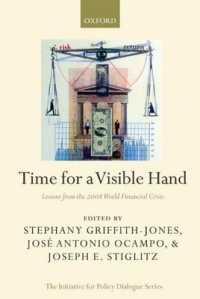- ホーム
- > 洋書
- > 英文書
- > Business / Economics
Full Description
Tourism is a vital tool for political and economic change. Calls for boycotts by tourists of countries reflect the huge impact that tourist activity and the tourism industry has on political change.
Contents
Introduction; Politics and Tourism: Interdependency and Implications in Understanding Change; Part I: Unification/Reunification, 3 German
Reunification and Tourism in Berlin, 4 The European Union: Between the Global and the National, and Between Neo-Liberalism and Interventionism, 5 The
Implications and Effects of the Handover of Colonies - Macau; Part II: Increasing Autonomy, 6 Devolution - Towards Independence: Tourism in Scotland in the 21st Century, 7 Political Change and Tourism in Arctic Canada, 8 Central and Eastern Europe: the End of the Soviet Union and its Satellites; Part III:Normalisation/Opening, 9 Tourism as an Instrument of Foreign Policy: the U.S Trade Embargo on Cuba, 10 Arab Politics and Tourism: Political Change and Tourism in the Great Socialist People's Libyan Arab Jamahiriya, 11 From Apartheid to a 'Managed Revolution': Tourism Development and the Transition in South Africa, 12 Tourism and Political Transition in Reform-Era Vietnam; Part IV: Political Unrest, 13 Tourism and Political Change in Nepal, 14 Political Change and Tourism: Coups in Fiji, 15 Iran or Persia: What's in a Name? The Decline and Fall of a Tourism Industry; Part V: Changes in Political Relations, 16
Does Tourism have a Role in Promoting Peace on the Korean Peninsula?, 17 The Opening of the Ledra Crossing in Nicosia: Social and Economic Consequences, 18 Politics on Ice - Tourism in Antarctica, Conclusions, 19 Conclusions; Index







